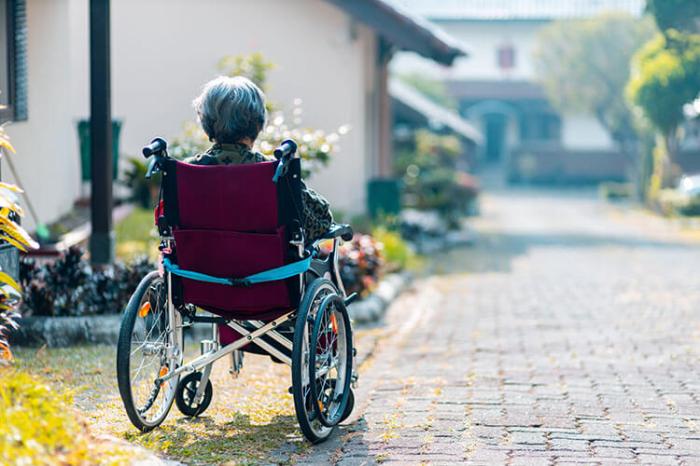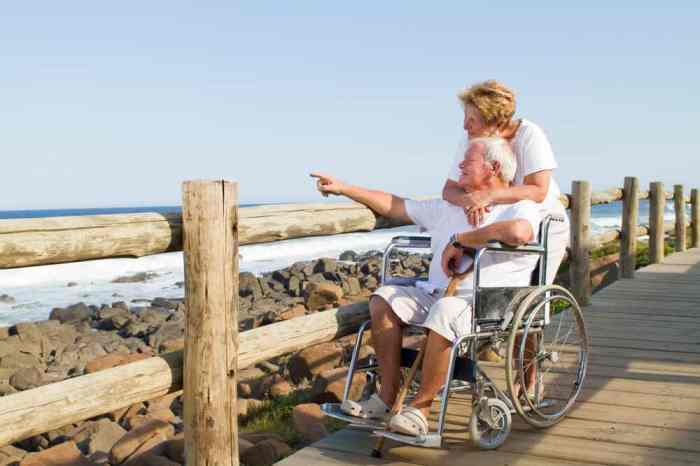Vacations For Seniors With Limited Mobility: Planning a getaway shouldn’t be hampered by physical limitations. This guide explores accessible travel options, from meticulously chosen destinations boasting wheelchair ramps and accessible restrooms to meticulously planned cruises and all-inclusive resorts catering to specific needs. We delve into practical tips for booking, managing health concerns en route, and adapting popular activities to ensure a memorable and comfortable experience for seniors with limited mobility.
The article meticulously details accessible travel destinations, highlighting transportation options and suitable hotels. Cruises are analyzed for their accessibility features, comparing different cruise lines and offering a sample itinerary. All-inclusive resorts known for their senior-friendly accommodations are profiled, complete with price comparisons. A comprehensive step-by-step guide covers planning and booking, including tips on communicating accessibility needs and the importance of travel insurance.
Finally, the guide offers advice on adapting activities, managing health concerns, and packing essentials for seamless and enjoyable travel.
Accessible Travel Destinations

Planning a vacation for seniors with limited mobility requires careful consideration of accessibility features. Choosing the right destination can significantly enhance the travel experience, ensuring comfort and ease of movement. This section Artikels several destinations known for their accessibility, along with transportation options and hotel recommendations.
Accessible Travel Destinations and Transportation Options, Vacations For Seniors With Limited Mobility
Selecting a destination with readily available accessibility features is paramount. Below is a table detailing ten locations ideal for seniors with mobility challenges, along with their accessibility features and transportation options. The selection prioritizes destinations with well-established accessible infrastructure and readily available assistance.
| Destination | Country | Accessibility Features | Recommended Activities |
|---|---|---|---|
| San Diego, California | USA | Wheelchair ramps prevalent throughout the city, accessible public transportation (trolleys and buses), many hotels with accessible rooms and elevators. | Balboa Park (accessible pathways and museums), Gaslamp Quarter (mostly flat terrain), harbor cruises (accessible boarding). |
| Amsterdam, Netherlands | Netherlands | Extensive network of well-maintained wheelchair-accessible pathways, trams and buses with low floors and ramps, many hotels with accessible rooms and elevators. | Canal tours (accessible boats), Rijksmuseum (accessible entrances and elevators), Anne Frank House (accessible entrance, but some areas may have limited access). |
| Quebec City, Canada | Canada | Many historical sites offer accessible entrances and elevators, accessible public transportation, numerous hotels with accessible rooms. Note: Cobblestone streets may present challenges in some areas. | Old Quebec (accessible pathways in many areas), Citadelle (accessible entrance), Plains of Abraham (mostly flat terrain). |
| Bath, England | UK | Many historical sites offer accessible entrances and ramps, accessible public transportation, hotels with accessible rooms. Note: Cobblestone streets in some areas. | Roman Baths (accessible entrance and ramps), Bath Abbey (accessible entrance), Jane Austen Centre (accessible entrance). |
| Honolulu, Hawaii | USA | Many hotels and resorts offer accessible rooms and amenities, accessible transportation options available, including wheelchair-accessible taxis and ride-sharing services. | Waikiki Beach (accessible beach wheelchairs available), Pearl Harbor (accessible pathways and museums), Diamond Head State Monument (limited accessibility, some areas may be challenging). |
| Berlin, Germany | Germany | Excellent public transportation with accessible options, many museums and attractions offer accessible entrances and elevators, numerous hotels with accessible rooms. | Brandenburg Gate (accessible), Reichstag Building (accessible), East Side Gallery (accessible pathways). |
| Kyoto, Japan | Japan | Many temples and gardens offer accessible pathways and ramps (though some may have limited access), accessible public transportation, hotels with accessible rooms. | Kinkaku-ji (Golden Pavilion – accessible), Kiyomizu-dera Temple (partially accessible), Arashiyama Bamboo Grove (accessible pathways). |
| Lisbon, Portugal | Portugal | Many historical sites offer accessible entrances and elevators, accessible trams and buses, hotels with accessible rooms. Note: Steep hills and uneven pavements in some areas. | Jerónimos Monastery (accessible), Belém Tower (accessible), São Jorge Castle (partially accessible, some steep inclines). |
| Sydney, Australia | Australia | Accessible public transportation, many attractions offer accessible entrances and elevators, hotels with accessible rooms. | Sydney Opera House (accessible), Royal Botanic Garden Sydney (accessible pathways), Bondi Beach (accessible beach wheelchairs available). |
| Vancouver, Canada | Canada | Extensive accessible public transportation system, many hotels and attractions offer accessible features, including ramps and elevators. | Stanley Park Seawall (accessible pathway), Granville Island Market (accessible), Gastown (mostly flat terrain). |
Accessible Hotel and Resort Recommendations
Choosing a hotel with excellent accessibility features is crucial. While specific accessibility features vary, hotels generally offering superior accessibility for seniors with limited mobility often include features such as: roll-in showers, grab bars in bathrooms, wider doorways, and accessible elevators. Many hotel chains, such as Marriott, Hilton, and Hyatt, have robust accessibility programs and readily available information on their websites regarding specific hotel accessibility features.
It is always advisable to contact the hotel directly to confirm specific accessibility details before booking.
Managing Health Concerns During Travel: Vacations For Seniors With Limited Mobility

Planning a vacation requires careful consideration, especially for seniors with limited mobility. Successfully navigating travel involves proactive management of health concerns to ensure a safe and enjoyable experience. This includes meticulous preparation and understanding potential challenges.Pre-trip medical consultations are paramount. Thorough preparation minimizes risks and allows for a more relaxed trip.
Medication Management
Effective medication management is crucial for seniors with chronic conditions. Packing sufficient medication in clearly labeled, easily accessible containers is essential. Consider carrying a copy of prescriptions and a list of allergies. Travelers should also understand how temperature fluctuations might affect their medications and take appropriate precautions, such as using insulated bags. For individuals requiring refrigeration, portable cooling units can be a valuable investment.
Finally, familiarity with local pharmacies and the process of obtaining refills abroad is advisable.
Managing Chronic Conditions
Seniors with chronic conditions, such as heart disease, diabetes, or respiratory illnesses, need to develop a detailed travel plan that addresses their specific needs. This includes carrying emergency contact information, necessary medical equipment (e.g., inhalers, blood glucose monitors), and a clear understanding of their condition’s management during travel. Consider packing extra supplies in case of delays or unforeseen circumstances.
Planning for potential exacerbations of chronic conditions, such as increased fatigue during travel, is equally important. For example, scheduling frequent rest stops during long journeys can significantly reduce stress on the body and minimize the risk of complications.
Pre-Travel Medical Consultations and Clearance
Before embarking on any journey, a consultation with a physician is strongly recommended. This allows for a review of current medications, potential risks associated with travel, and necessary vaccinations or preventive measures. The doctor can provide guidance on managing chronic conditions during travel and offer advice on handling potential medical emergencies. Obtaining medical clearance, especially for those with significant health concerns, ensures peace of mind and facilitates appropriate care should complications arise.
This consultation is not merely a formality; it is a critical step in ensuring a safe and successful trip.
Handling Medical Emergencies Abroad
Having a comprehensive travel insurance plan that covers medical emergencies is non-negotiable. This plan should include emergency evacuation coverage, which can be vital in situations requiring immediate medical attention in a foreign country. Knowing the location of the nearest hospital or medical clinic at your destination is also prudent. Travelers should also familiarize themselves with emergency contact numbers for local medical services and their embassy or consulate.
Carrying a detailed medical history, including allergies and current medications, in a readily accessible location is also highly recommended. Consider creating a digital copy accessible via a smartphone or other electronic device in addition to a printed copy. Finally, learning basic phrases in the local language related to medical needs can prove invaluable in emergency situations.
Ultimately, a fulfilling vacation is achievable for seniors with limited mobility with careful planning and the right resources. By understanding accessibility options, prioritizing health and safety, and utilizing available technologies, seniors can enjoy enriching travel experiences without compromising comfort or independence. This guide serves as a roadmap, empowering individuals and their families to explore the world with confidence and create lasting memories.

